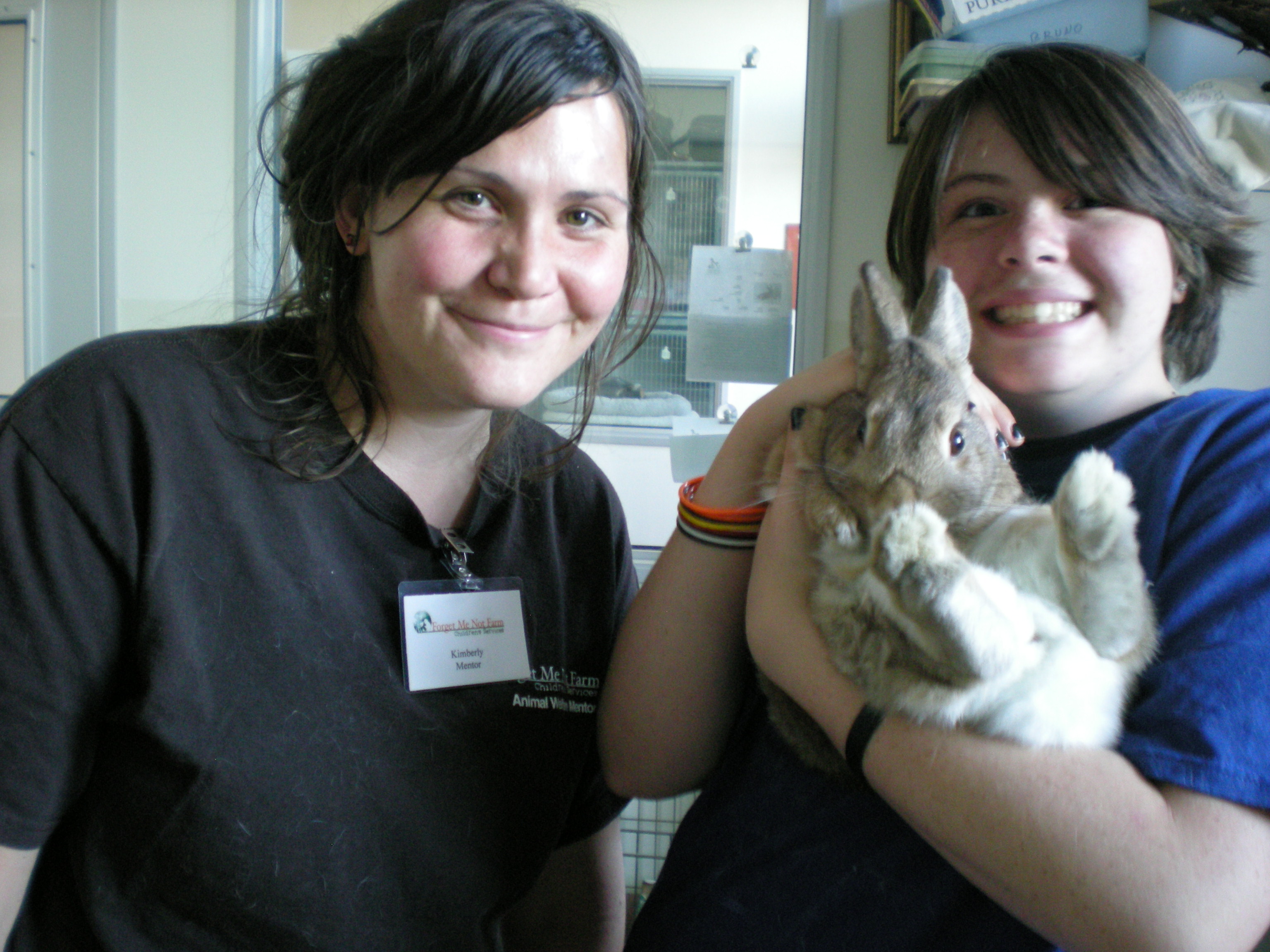
Forget Me Not Farm: Where Animals Help Heal
The newest Kars4Kids small grant recipient is Forget Me Not Farm, where foster and at-risk children can heal from trauma and abuse, and learn a vocation, too. The vehicle for healing at Forget Me Not Farm is animals. That spoke to us at Kars4Kids because of the two petting zoos we maintain at TheZone, where (mostly urban) campers may cuddle bunnies to their hearts’ content, and receive some unconditional love in return. We were happy to give a hand to this like-minded nonprofit, and spoke to Founder and Director Carol Rathmann to learn more about Forget Me Not Farm.
Kars4Kids: What is it about animals that is so essentially healing to troubled children?
Carol Rathmann: That is a good question that hasn’t been answered yet. Most kids who come to our farm and agency like animals. They feel comfortable with them. They can build relationships with animals that don’t require communication, eye contact, judgement, etc. Many of our kids have been removed from their homes and lost their personal pets so they are thrilled to be in one of our programs and have access to farm animals as well as dogs and cats. Certainly animals are nonjudgmental so that helps as well.
Kars4Kids: How do children find their way into the Forget Me Not Farm programs?
Carol Rathmann: Word of mouth mostly. We have been around for over 25 years and get referrals from most agencies that work with foster and at-risk youth. Once in a while we go into specific neighborhoods to let youth know about our programs.
Kars4Kids: Tell us about your mentoring program.
Carol Rathmann: Our mentoring program was designed for youth in the foster system. We started this program in 2005 when we realized that youth in our farm program were losing services the day they turned 18. At that time bad decisions are often made and foster youth return to their abusive families, move onto the street or find a flop-house with other youth.
We wanted to give these kids an opportunity to learn some job skills that could be used in any employment situation. We are a part of the Humane Society of Sonoma County which has a huge compound with lots of departments. The vocational youth mentoring program matches youth between the ages of 14-18 (or older if still in foster care) with an adult mentor. They attend four weeks of orientation which educates them about animal welfare, our agencies and they learn about all of the different departments where they might work.
The mentors also attend the orientation and during that time it helps us to see who might be a good match. At the end of the training the youth is paired with an adult and assigned to a department of their choice. Once they get to that department they are likely to receive more extensive training particular to that department.
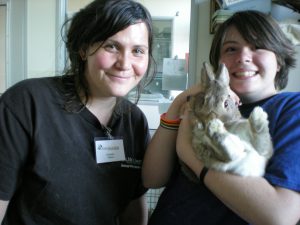
This is an after school program and the youth come once a week for 2 hours. They arrive at our office and have a snack and then put on their work t-shirts and name tags and pick up supplies that might be needed in their assigned area. Then they go to their work area with their mentor and do whatever tasks have been assigned for them. They finish a few minutes early and everyone has the opportunity to relax with an animal before returning to our office and signing out.
Of course we have staff and foster animals at our office all of the time. Youth are asked to participate for a minimum of 3 months and can stay as long as they want or until they get a job.
The program design is for the youth to learn the very easy and basic skills necessary to be successfully employed. Getting here on time, wearing the uniform, making eye contact when talking to others, being polite and respectful, etc.
Kars4Kids: Can you tell us a particularly rewarding story of a child enrolled in a Forget Me Not Farm program?
Carol Rathmann: There was a girl (Sabrina) who came to Forget Me Not Farm as an 8-year-old. She had been removed from her mother’s care after 8 years of abuse and 26 CPS reports. Her 4 siblings had been removed from the home during her mother’s pregnancy with her.
She was living at the Valley of the Moon Children’s Home when she first arrived. She absolutely loved animals and was fearless around them all, including 2 emus that the rest of us were nervous around. Over the next 10 years we saw her on and off as she moved around the system from foster home to foster home and then to group homes.
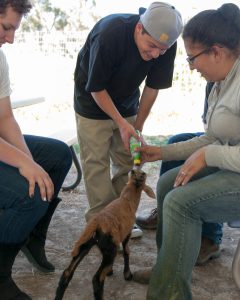
There was a period of about 12 months that she was in another county and we didn’t see her. She ended up at a local agency that provides schooling, housing and therapeutic services. Again she was at the farm once a week. As she got close to 18 I knew we had to help her so she was our first mentee in our pilot mentoring program. I matched her with a volunteer who loved kittens (also her passion) and together they worked with kittens but also wrote a foster kitten care manual for children.
When she had her 18th birthday she invited me to her high school graduation ceremony. I was the only one outside of schoolmates and teachers who attended. After the ceremony and lunch she was driven to a new location where she would be living. So on her 18th birthday she lost her school, her group home and friends, children’s services and was moved to a new place where she didn’t know anyone.
I stayed in contact with her and soon became her mentor. I encouraged her to take some veterinary assistant classes at the local junior college but she was not successful due to some math requirements that she couldn’t meet. She confided to me that the school she attended taught to the lowest student and although she didn’t have any learning disabilities she was deprived of a good education.
After some unsuccessful attempts at school she began working for her neighbors and helping them with their animals. She walked dogs, cleaned litter boxes, fed and watered animals for those who were not able to do the job. Soon she was employed by the manager of an independent senior living facility close to her apartment. She continues to help the residents with their animals. 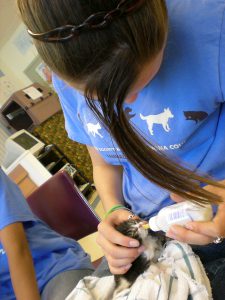
She also became a trusted foster parent in the Humane Society’s foster kitten program. She has successfully bottle fed many kittens and prepared them for adoption.
Today she works two part-time jobs and still rescues animals. We are in constant contact and just last week celebrated her 30th birthday. She is not in contact with any members of her family.
Kars4Kids: Do you ever have issues with abused children mistreating the animal at Forget Me Not Farm?
Carol Rathmann: Only one time in over 25 years. We had a young man who collected frogs and other small insects while he was at the farm and tortured them back at his group home. As soon as I knew about this behavior I consulted with some professional psychologists. One who worked with children and one who worked with children who had committed crimes against animals and he also worked with serial killers. After much discussion it was decided his needs were greater than our skill level and we referred him on to individual therapy.
Kars4Kids: Tell us what kinds of produce you grow and what you cook with these items in Project HOME.
Carol Rathmann: Initially we planted everything that would grow only to find out that the kids wouldn’t eat or even try much of it. Next we checked with cooks at the agencies to see what the kids would eat. Now we plant the standards like lettuce, tomatoes, onions, zucchini, peppers, melons, etc. Things we know the kids will eat.
Our second tier of planting are the items we hope the children will eat such as kale, chard, eggplant, sweet potatoes, etc. To encourage eating those we make some fun, kid-friendly foods. All of our meals or snacks are vegetarian but not necessarily vegan. We use a lot of cheese to make the foods palatable for kids who are accustomed to processed foods heavy in fat and salt. We also use a lot of Ranch Dip for cold veggies such as carrots, celery, radishes, turnips, etc. We make a lot of soups with butternut squash, kale and chard. This is a great way to introduce them to new tastes.
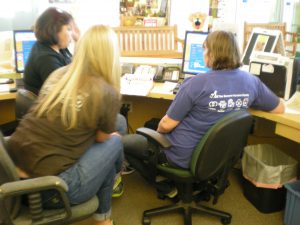
We also have some fun activities where we cook one vegetable several ways and vote on the favorite. We did this with beets and it was fun. We had beet juice, pickled beets, beet soup, beets burgers, roasted beets and even beet chips. We try to be creative to encourage the kids to at least try something.
We make salsa with the tomatoes—each child gets to customize their own bowl and it is one of the favorite activities. We make homemade pickles with our cucumbers, onions and peppers
We make pizza using eggplant and that has been very popular. I could go on and on.
Kars4Kids: Are there many jobs available in the professions associated with your mentoring program (Animal Care Technician, Dog Trainer, Dog Groomer, Veterinary Assistant, Farm Animal Attendant, Garden Specialist, and Customer Service Clerk, for example)?
Carol Rathmann: Research shows that when the economy goes down spending on pets goes UP. Yes—there are many jobs in the pet industry that will always be available and unlikely to be high-teched out. No robots to hold dogs for vaccines or scruff kitties for an exam.
The most entry level animal job could be kennel cleaning at a veterinary hospital, veterinary school or animal shelter. Many jobs like that exist at county animal control agencies which would provide steady work and good benefits. There are also jobs in the pet shop industry, grooming salons and pet sitting. Additionally, our youth have exposure to our production gardens, grounds and barn maintenance and large animal care. All of our departments focus on good customer service which can transfer to any job.
Kars4Kids: What happens if a child is attached to an animal and the animal succumbs to illness? Has this happened?
Carol Rathmann: Yes—we have lost animals due to illness or old age. If we know an animal is getting close to the end of its life, we try to let all of the children know what is going on and prepare them for the final days. Sudden illnesses are a little trickier.
We also talk to the kids realistically about death and dying and we always go the extra mile for our animals so that everyone can feel everything possible was done to save the life. If we know there is a special relationship between a child and lost or dying animal, we try to prepare them and give them time to have closure. No matter how we do it there is still sadness and we let the kids know that is normal and okay.
In the beginning of each group we have an opening circle and this is when we might talk about an animal that had died since their last visit. We encourage the kids to ask questions and talk about the animal if they want. If we can see that someone is particularly upset, we will make sure that child has an adult with him/her throughout the visit to help process the event. We can also call the agency ahead of time if we feel the child needs to be prepared.
Kars4Kids: Do you have any graduates who have come back to volunteer with Forget Me Not Farm?
Carol Rathmann: Yes—we see kids from our program periodically. Some just show up at the farm and want to visit the animals. Others show up at the Humane Society with stray or abandoned animals that they may have found. Sabrina, who I mentioned earlier, brings her group of senior citizens out to the farm annual for a visit.
Kars4Kids: What’s next for Forget Me Not Farm?
Carol Rathmann: We would love to expand our facility to be able to rescue and rehome more farm animals. Right now we are limited by our one barn to how many animals we can house. Most of the animals here are permanent residents but we occasionally take in other animals to rehab and rehome.
One of the projects that we are working on right now is designing a data collection system and process to illustrate what is going on with the children while they are interacting with the animals. It is far too complicated to describe right now but we are setting up a pilot program and hope to get funding for a larger study. We have partnered with the HeartMath Institute and Sonoma State University and are very excited about this research.